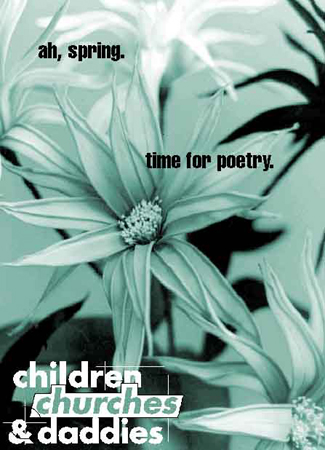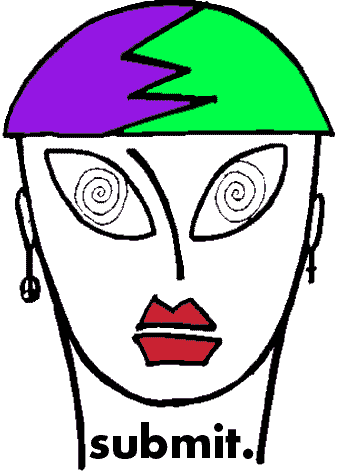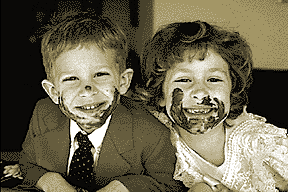|
Dusty Dog Reviews The whole project is hip, anti-academic, the poetry of reluctant grown-ups, picking noses in church. An enjoyable romp! Though also serious.
|
![]()

![]()
|
Nick DiSpoldo, Small Press Review (on Children, Churches and Daddies, April 1997) Children, Churches and Daddies is eclectic, alive and is as contemporary as tomorrow’s news. |
![]()
![]()
Children, Churches and Daddies
Volume 33 - ‘Spring’
The Unreligious, Non-Family-Oriented Literary and Art Magazine
ISSN 1068-5154

|
Lucy’s Beauty Routines, by Mary Winters
High school friend a real beauty -
with you (2/18/94), by Janet Kuypers
It’s Friday again
Couldn’t put if off any longer:
Pocket Knife, by Gabriel Athens
I saw you there
Drench me
untitled, by M. Kettner sunrise/fishermen on the pier
I have been third claaa
Nasal Congestion, by Marc Swan
Randall P is fat
Every house has rules
The Pigeon Man SingsMark Blickley
rough day/eaves overflowing with rain
Old Man Directing Traffic in a Dream that Never Ends, Albany. N.Y., by Alan Catlin
His is the mind in rapid transit
House Divided, by Gary A. Scheinoha
We built this house
Kiss and Tell, byn Marc Swan
In the paper-thin light
Like Daggers, by Alexandria Rand
I can’t think of anything else.
I must admit
Morning, by Mary Winters
Suddenly after breakfast one morning
Nature Shows, by Mary Winters
The way of all flesh: to
Fish, by Janet Kuypers
|

|
One piece in this issue is “Crazy,” an interview Kuypers conducted with “Madeline,” a murderess who was found insane, and is confined to West Virginia’s Arronsville Correctional Center. Madeline, whose elevator definitely doesn’t go to the top, killed her boyfriend during sex with an ice pick and a chef’s knife, far surpassing the butchery of Elena Bobbitt. Madeline, herself covered with blood, sat beside her lover’s remains for three days, talking to herself, and that is how the police found her. For effect, Kuypers publishes Madeline’s monologue in different-sized type, and the result is something between a sense of Dali’s surrealism and Kafka-like craziness.
|
Debra Purdy Kong, writer, British Columbia, Canada
I like the magazine a lot. I like the spacious lay-out and the different coloured pages and the variety of writer’s styles. Too many literary magazines read as if everyone graduated from the same course. We need to collect more voices like these and send them everywhere.
|
As for the fiction, the piece by Anderson is quite perceptive: I liked the way the self-deluding situation of the character is gradually, subtly revealed. (Kuypers’) story is good too: the way it switches narrative perspective via the letter device is a nice touch.
|
Children, Churches and Daddies.
It speaks for itself.
Write to Scars Publications to submit poetry, prose and artwork to Children, Churches and Daddies literary magazine, or to inquire about having your own chapbook, and maybe a few reviews like these.
|
|
what is veganism?
A vegan (VEE-gun) is someone who does not consume any animal products. While vegetarians avoid flesh foods, vegans don’t consume dairy or egg products, as well as animal products in clothing and other sources.
why veganism?
This cruelty-free lifestyle provides many benefits, to animals, the environment and to ourselves. The meat and dairy industry abuses billions of animals. Animal agriculture takes an enormous toll on the land. Consumtion of animal products has been linked to heart disease, colon and breast cancer, osteoporosis, diabetes and a host of other conditions.
so what is vegan action?
We can succeed in shifting agriculture away from factory farming, saving millions, or even billions of chickens, cows, pigs, sheep turkeys and other animals from cruelty.
We can free up land to restore to wilderness, pollute less water and air, reduce topsoil reosion, and prevent desertification.
We can improve the health and happiness of millions by preventing numerous occurrences od breast and prostate cancer, osteoporosis, and heart attacks, among other major health problems.
A vegan, cruelty-free lifestyle may be the most important step a person can take towards creatin a more just and compassionate society. Contact us for membership information, t-shirt sales or donations.
vegan action
po box 4353, berkeley, ca 94707-0353
510/704-4444
|
I really like (“Writing Your Name”). It’s one of those kind of things where your eye isn’t exactly pulled along, but falls effortlessly down the poem. I liked “knowledge” for its mix of disgust and acceptance. Janet Kuypers does good little movies, by which I mean her stuff provokes moving imagery for me. Color, no dialogue; the voice of the poem is the narrator over the film.
|
Children, Churches and Daddies no longer distributes free contributor’s copies of issues. In order to receive issues of Children, Churches and Daddies, contact Janet Kuypers at the cc&d e-mail addres. Free electronic subscriptions are available via email. All you need to do is email ccandd@scars.tv... and ask to be added to the free cc+d electronic subscription mailing list. And you can still see issues every month at the Children, Churches and Daddies website, located at http://scars.tv
|
|
MIT Vegetarian Support Group (VSG)
functions:
* To show the MIT Food Service that there is a large community of vegetarians at MIT (and other health-conscious people) whom they are alienating with current menus, and to give positive suggestions for change.
* To exchange recipes and names of Boston area veg restaurants
* To provide a resource to people seeking communal vegetarian cooking
* To provide an option for vegetarian freshmen
We also have a discussion group for all issues related to vegetarianism, which currently has about 150 members, many of whom are outside the Boston area. The group is focusing more toward outreach and evolving from what it has been in years past. We welcome new members, as well as the opportunity to inform people about the benefits of vegetarianism, to our health, the environment, animal welfare, and a variety of other issues.
|
|
Dusty Dog Reviews: These poems document a very complicated internal response to the feminine side of social existence. And as the book proceeds the poems become increasingly psychologically complex and, ultimately, fascinating and genuinely rewarding.
|
Some excellent writing in “Hope Chest in the Attic.” I thought “Children, Churches and Daddies” and “The Room of the Rape” were particularly powerful pieces.
|
C Ra McGuirt, Editor, The Penny Dreadful Review: cc&d is obviously a labor of love ... I just have to smile when I go through it. (Janet Kuypers) uses her space and her poets to best effect, and the illos attest to her skill as a graphic artist.
|
|
Dusty Dog Reviews: She opens with a poem of her own devising, which has that wintry atmosphere demonstrated in the movie version of Boris Pasternak’s Doctor Zhivago. The atmosphere of wintry white and cold, gloriously murderous cold, stark raging cold, numbing and brutalizing cold, appears almost as a character who announces to his audience, “Wisdom occurs only after a laboriously magnificent disappointment.” Alas, that our Dusty Dog for mat cannot do justice to Ms. Kuypers’ very personal layering of her poem across the page.
Fithian Press, Santa Barbara, CA
Indeed, there’s a healthy balance here between wit and dark vision, romance and reality, just as there’s a good balance between words and graphics. The work shows brave self-exploration, and serves as a reminder of mortality and the fragile beauty of friendship.
Mark Blickley, writer
The precursor to the magazine title (Children, Churches and Daddies) is very moving. “Scars” is also an excellent prose poem. I never really thought about scars as being a form of nostalgia. But in the poem it also represents courage and warmth. I look forward to finishing her book.
You Have to be Published to be Appreciated.
Do you want to be heard? Contact Children, Churches and Daddies about book or chapbook publishing. These reviews can be yours. Scars Publications, attention J. Kuypers. We’re only an e-mail away. Write to us.
|
|
The Center for Renewable Energy and Sustainable Technology
The Solar Energy Research & Education Foundation (SEREF), a non-profit organization based in Washington, D.C., established on Earth Day 1993 the Center for Renewable Energy and Sustainable Technology (CREST) as its central project. CREST’s three principal projects are to provide:
* on-site training and education workshops on the sustainable development interconnections of energy, economics and environment;
* on-line distance learning/training resources on CREST’s SOLSTICE computer, available from 144 countries through email and the Internet;
* on-disc training and educational resources through the use of interactive multimedia applications on CD-ROM computer discs - showcasing current achievements and future opportunities in sustainable energy development.
The CREST staff also does “on the road” presentations, demonstrations, and workshops showcasing its activities and available resources.
For More Information Please Contact: Deborah Anderson
dja@crest.org or (202) 289-0061
|
|
Dorrance Publishing Co., Pittsburgh, PA
“Hope Chest in the Attic” captures the complexity of human nature and reveals startling yet profound discernments about the travesties that surge through the course of life. This collection of poetry, prose and artwork reflects sensitivity toward feminist issues concerning abuse, sexism and equality. It also probes the emotional torrent that people may experience as a reaction to the delicate topics of death, love and family.
“Chain Smoking” depicts the emotional distress that afflicted a friend while he struggled to clarify his sexual ambiguity. Not only does this thought-provoking profile address the plight that homosexuals face in a homophobic society, it also characterizes the essence of friendship. “The room of the rape” is a passionate representation of the suffering rape victims experience. Vivid descriptions, rich symbolism, and candid expressions paint a shocking portrait of victory over the gripping fear that consumes the soul after a painful exploitation.
want a review like this? contact scars about getting your own book published.
|
|
![]()

The magazine Children Churches and Daddies is Copyright ©
through
Scars Publications and Design. The rights of the individual pieces remain with the authors. No material may be reprinted without express permission from the author.
Okay, nilla wafer. Listen up and listen good. How to save your life. Submit, or I’ll have to kill you.
Okay, butt-munch. Tough guy. This is how to win the editors over.
Carlton Press, New York, NY: HOPE CHEST IN THE ATTIC is a collection of well-fashioned, often elegant poems and short prose that deals in many instances, with the most mysterious and awesome of human experiences: love... Janet Kuypers draws from a vast range of experiences and transforms thoughts into lyrical and succinct verse... Recommended as poetic fare that will titillate the palate in its imagery and imaginative creations.
You Have to be Published to be Appreciated.
Dorrance Publishing Co., Pittsburgh, PA: “Hope Chest in the Attic” captures the complexity of human nature and reveals startling yet profound discernments about the travesties that surge through the course of life. This collection of poetry, prose and artwork reflects sensitivity toward feminist issues concerning abuse, sexism and equality. It also probes the emotional torrent that people may experience as a reaction to the delicate topics of death, love and family. “Chain Smoking” depicts the emotional distress that afflicted a friend while he struggled to clarify his sexual ambiguity. Not only does this thought-provoking profile address the plight that homosexuals face in a homophobic society, it also characterizes the essence of friendship. “The room of the rape” is a passionate representation of the suffering rape victims experience. Vivid descriptions, rich symbolism, and candid expressions paint a shocking portrait of victory over the gripping fear that consumes the soul after a painful exploitation.
Debra Purdy Kong, writer, British Columbia, Canada (on Children, Churches and Daddies): I like the magazine a lot. I like the spacious lay-out and the different coloured pages and the variety of writer’s styles. Too many literary magazines read as if everyone graduated from the same course. We need to collect more voices like these and send them everywhere.
ccandd96@scars.tv
Publishers/Designers Of
Sponsors Of

Okay, it’s this simple: send me published or unpublished poetry, prose or art work (do not send originals), along with a bio, to us - then sit around and wait... Pretty soon you’ll hear from the happy people at cc&d that says (a) Your work sucks, or (b) This is fancy crap, and we’re gonna print it. It’s that simple!
Hope Chest in the Attic is a 200 page, perfect-bound book of 13 years of poetry, prose and art by Janet Kuypers. It’s a really classy thing, if you know what I mean. We also have a few extra sopies of the 1999 book “Rinse and Repeat”, the 2001 book “Survive and Thrive”, the 2001 books “Torture and Triumph” and “(no so) Warm and Fuzzy”,
which all have issues of cc&d crammed into one book. And you can have either one of these things at just five bucks a pop if you just contact us and tell us you saw this ad space. It’s an offer you can’t refuse...
Mark Blickley, writer: The precursor to the magazine title (Children, Churches and Daddies) is very moving. “Scars” is also an excellent prose poem. I never really thought about scars as being a form of nostalgia. But in the poem it also represents courage and warmth. I look forward to finishing the book.
Do you want to be heard? Contact Children, Churches and Daddies about book and chapbook publishing. These reviews can be yours. Scars Publications, attention J. Kuypers - you can write for yourself or you can write for an audience. It’s your call...
Dusty Dog Reviews, CA (on knife): These poems document a very complicated internal response to the feminine side of social existence. And as the book proceeds the poems become increasingly psychologically complex and, ultimately, fascinating and genuinely rewarding.
Children, Churches and Daddies. It speaks for itself.
Dusty Dog Reviews (on Without You): She open with a poem of her own devising, which has that wintry atmosphere demonstrated in the movie version of Boris Pasternak’s Doctor Zhivago. The atmosphere of wintry white and cold, gloriously murderous cold, stark raging cold, numbing and brutalizing cold, appears almost as a character who announces to his audience, “Wisdom occurs only after a laboriously magnificent disappointment.” Alas, that our Dusty Dog for mat cannot do justice to Ms. Kuypers’ very personal layering of her poem across the page.
Children, Churches and Daddies. It speaks for itself.
Fithian Press, Santa Barbara, CA: Indeed, there’s a healthy balance here between wit and dark vision, romance and reality, just as there’s a good balance between words and graphics. The work shows brave self-exploration, and serves as a reminder of mortality and the fragile beauty of friendship.
the unreligious, non-family oriented literary and art magazine
Scars Publications and Design
http://scars.tv
Children, Churches and Daddies magazine
cc+d Ezines
The Burning mini poem books
God Eyes mini poem books
The Poetry Wall Calendar
The Poetry Box
The Poetry Sampler
Mom’s Favorite Vase Newsletters
Reverberate Music Magazine
Down In The Dirt magazine
Freedom and Strength Press forum
plus assorted chapbooks and books
music, poery compact discs
live performances of songs and readings
past editions:
Poetry Chapbook Contest, Poetry Book Contest
Prose Chapbook Contest, Prose Book Contest
Poetry Calendar Contest
current editions:
Editor’s Choice Award (writing and web sites)
Collection Volumes
Children, Churches and Daddies (ISSN 1068-5154) is published quarterly by Scars Publications and Design. Contact us via e-mail (ccandd96@scars.tv) for subscription rates
or prices for annual collection books.
To contributors:
No racist, sexist or blatantly homophobic material. No originals; if mailed, include SASE & bio.
Work sent on disks or through e-mail preferred. Previously published work accepted. Authors always retain rights to their own work. All magazine rights reserved. Reproduction of
Children, Churches and Daddies without publisher permission is forbidden.
Children, Churches and Daddies copyright
through
Scars Publications and Design, Children, Churches and Daddies, Janet Kuypers. All rights remain with the authors of the individual
pieces. No material may be reprinted without express permission.
 Barber Shop, by Mary Winters
Barber Shop, by Mary Winters Womyn, by Cheryl Townsend
Womyn, by Cheryl Townsend House of Slavs, by Gary A. Scheinoha
House of Slavs, by Gary A. Scheinoha untitled, by M. Kettner
untitled, by M. Kettner Sobering Up, by Gabriel Athens
Sobering Up, by Gabriel Athens